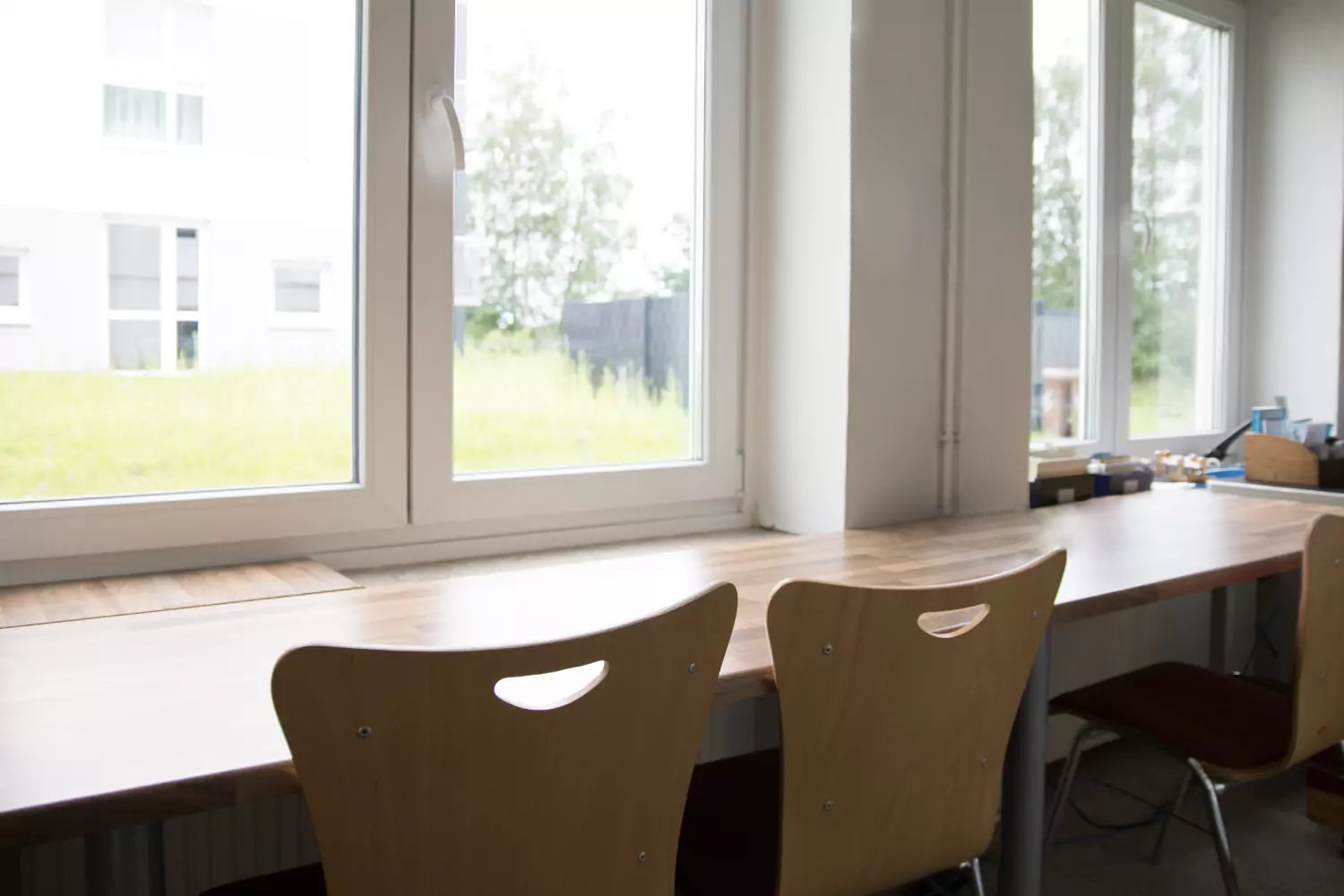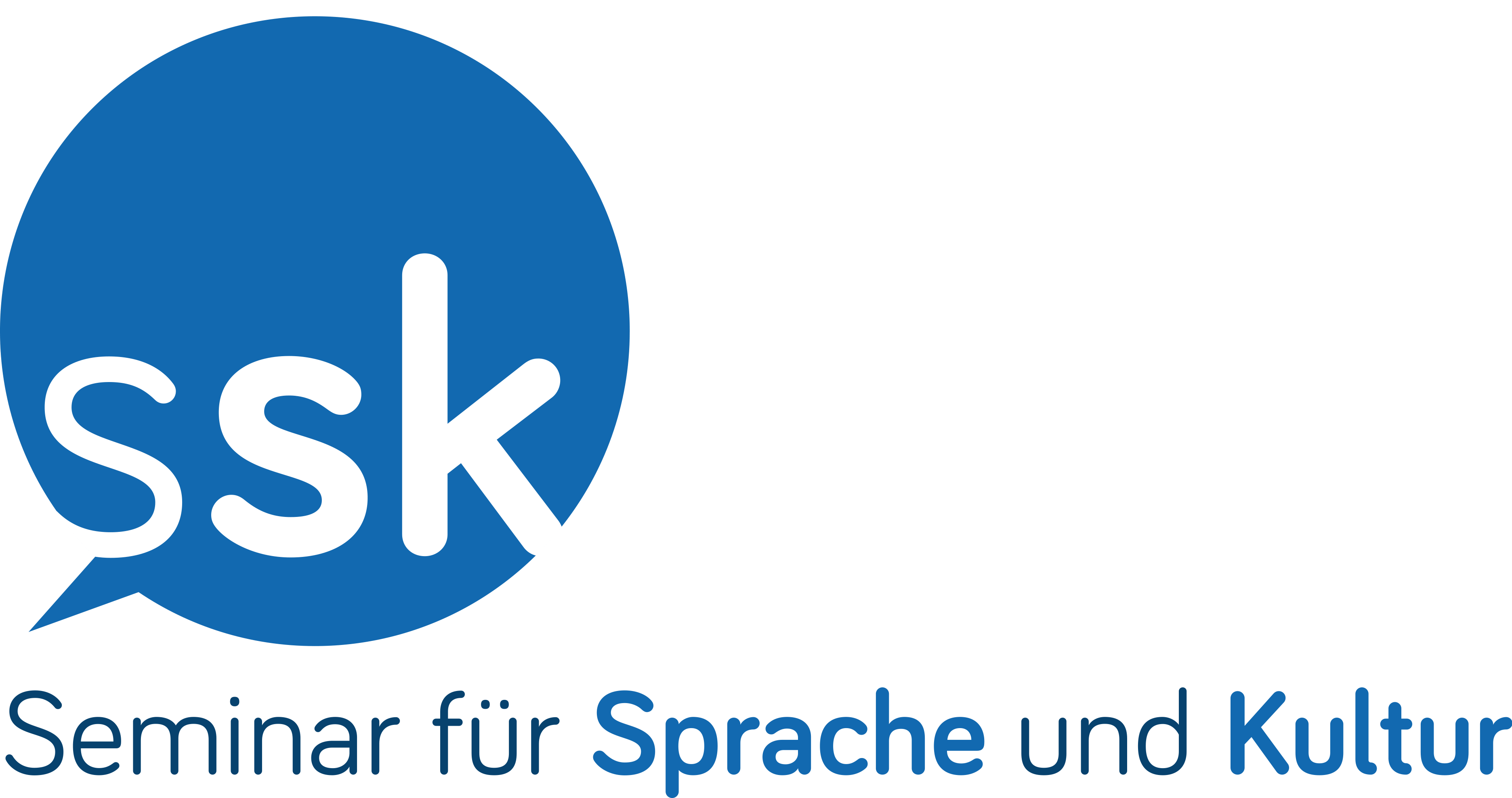
Welcome to the ssk library!
Our catalog is hosted on an external website maintained by an international library consortium. The ssk library is a consortium member. To search for materials in our local collection in the joint catalog, limit the search to ssk-Bibliothek using the drop-down menu to the right of the search bar.
The ssk library collection contains more than 6000 volumes on topics of interest to our course participants and staff. These include linguistics, literacy, second language acquisition, Biblical exegesis and translation, missiology, theology, religion, anthropology, intercultural communication, and teamwork. We also have Bibles and Bible portions in over 120 languages.

Opening hours
The ssk library is located in two rooms next to the ssk office on the lowest level of Karimu Conference Center. It is open 24/7.
Work stations
The room labeled Bibliothek I offers a small work area for our guests. Two computers and a printer are avaialble for public use.
Orientation to the collection and borrowing procedures
Books
Finding and borrowing books
Call number and location
- Books are organised by subject area using an internal classification system.
- Each major subject area is designated by a capital letter. Most subject areas are subdivided using lowercase letters and occasionally numbers.
- When a subject area has (further) subdivisions, books are only catalogued under the most specific subdivision.
- Books are individually numbered within each subdivision according to their date of acquisition, giving every book a unique call number consisting of a sequence of letters and numbers.
- The call number indicates the book’s location on the shelves.
- Subject areas A, K, T, U and X are located in the room called Bibliothek I. Subject areas B - I are located across the hall in Bibliothek II.
- The Call Number Index shows the organisational structure of the classification system.
Call number example
For a phonological description of an African language:
Linguistics books are in Subject area B.
The subgroup Bl is for language descriptions.
Blb contains descriptions of non-European languages.
Blbb is specifically for phonologies.
A geographical facet forms the last part of the call number, in this case, -c for Africa.
B = Linguistics
Bl = Linguistics / language descriptions
Blb = Linguistics / language descriptions / non-European languages
Blbb = Linguistics / language descriptions / non-European languages / phonologies
Blbb-c = Linguistics / language descriptions / non-European languages / phonologies – Africa
Borrowing procedure
- A book is checked out using the white borrowing card found in the pocket inside its back cover.
- The borrower’s first and last name (Entleiher) and the date (Datum) are written on the card.
- The card is placed in the red box labelled Leihscheine at the circulation station.
Journals
Finding and borrowing journals
Location and organisation
- Journals are located on the stacks in Bibliothek I, organised alphabetically by abbreviation of the journal title.
- The individual issues of each journal stand chronologically by volume (Band or Jahrgang) and issue number (Heft or Nummer).
- To find a journal article in the library, note the title (and abbreviation) of the journal and the relevant volume and issue number. The year of publication and page numbers can also be helpful to note.
- A list of journal titles with their abbreviations can also be found hanging on the end of the stacks in Bibliothek I.
Borrowing
- A journal is checked out using a blue borrowing card, Zeitschriftenleihschein, from the circulation station in Bibliothek I.
- The following information is written on the card:
Name der Zeitschrift – name of the journal (or the abbreviation)
Jahrgang – year or volume number
Nr. – issue number
Entleiher – borrower’s first and last name
Datum – date - The card is placed in the red box labelled Leihscheine at the circulation station.
- Journals require special permission for distance borrowing.
Offprints and reprints
Finding and borrowing
Location and organisation
- Offprints and reprints are found in a set of file drawers in Bibliothek I labelled ‘Sonderdrucke’.
- They are filed alphabetically by the author’s last name. Each author has one or more hanging folders in the file drawers.
- Within each folder, multiple articles by the same author are filed alphabetically by title.
Borrowing
- A reprint is checked out using a pink borrowing card, Leihschein für Sonderdrucke, from the circulation station in Bibliothek I.
- The following information is written on the card:
Titel – title of the article (reprint or offprint)
Autor – author
Entleiher – first and last name of borrower
Datum – date - The card is placed in the red box labelled Leihscheine at the circulation station.
- Reprints require special permission for distance borrowing.
CDs & DVDs
Finding and borrowing CDs und DVDs
Call number and location
- The CDs and DVDs are on one of the middle shelves against the wall in Bibliothek I.
- All CDs have the call number CDROM + a number, e.g. CDROM 14.
- All DVDs have the call number DVD + a number, e.g. DVD 04.
- CDs and DVDs are simply numbered according to the acquisition date.
Lending
- A CD or DVD is checked out using a green borrowing card, Leihschein für CDs und DVDs, from the circulation station in Bibliothek I.
- The following information is written on the card:
Name der CD / DVD – title of the CD or DVD
Signatur – call number, found on a white sticker on the case
Entleiher – first and last name of borrower
Datum – date - The card is placed in the red box labelled Leihscheine at the circulation station.
Online resources in subjects of interest
Links für Internet-Recherche über die ssk-Bibliothek hinaus
- Suchfunktionen, Datenbanken und Bibliothekskataloge
Index Theologicus
Der neue IxTheo ist eine umfassende Bibliographie für Theologie und Religionswissenschaft. Es können neben Aufsätzen auch Monographien, Datenbanken und relevante Internetlinks recherchiert werden.
JSTOR (nur auf Englisch)
JSTOR provides access to more than 12 million journal articles, books, images, and primary sources in 75 disciplines.
Für Information über Zugangsmöglichkeiten: Open Content on JSTOR oder Read Online for Free
Lin|gu|is|tik-Portal für Sprachwissenschaft
Das Lin|gu|is|tik-Portal ist ein Fachportal für die allgemeine und vergleichende Sprachwissenschaft sowie die Linguistiken der europäischen und außereuropäischen Einzelphilologien. Hier finden Sie fachspezifische, wissenschaftliche Ressourcen aller Art – sowohl konventionelle, gedruckte und elektronische Sekundärliteratur als auch digitale Informationsressourcen einschließlich Forschungsdaten.
Weitere Informationen zum Lin|gu|is|tik-Portal finded sie hier.
Elektronische Zeitschriftenbibliothek (EZB) der Universität Regensburg
Die Elektronische Zeitschriftenbibliothek ist ein Service zur effektiven Nutzung wissenschaftlicher Zeitschriften im Internet. Von einem Viertel der etwa 200.000 verzeichneten Zeitschriften ist der Volltext frei zugänglich. Weitere Informationen zur EZB hier. (Das ssk ist keine teilnehmende Einrichtung.)
Bibliotheks-Verzeichnis der Biblisch-Theologische Akademie (BTA) Wiedenest
Die ssk-Bibliotkek hat mit der Bibliothek der BTA eine gegenseitige Nutzung unserer Bibliotheken vereinbart. Die Ausleihe erfolgt durch Anfrage an das ssk-Bibliotheksteam.
A-Z Databases list from Dallas International University (früher TX-SIL / GIAL; nur auf Englisch)
The DIU Library provides links to multiple databases and online resources. Some are open-access; others require login with a current Dallas International library card. Further information about available services can be found on the website.
- Ressourcen von SIL International und Partnerorganisationen
Ethnologue – unbegrenzter Zugang auf dem Zentrum in Holzhausen
Scripture Engagement (Forum of Bible Agencies International)
Digital Training Library (for the Bible translation movement)
- Verschiedenes
Material von der Deutschen Arbeitsgemeinschaft für Evangelische Gehörlosenseelsorge e.V. (GAFEG)
biblische Texte – Lieder/Gebete – Bücher/Medien – downloads/links
Regionalsprache.de (REDE)
Das von der Akademie der Wissenschaften und der Literatur (Mainz) geförderte Langzeitprojekt Regionalsprache.de (REDE) ist ein Forschungsprojekt des Marburger Forschungszentrums Deutscher Sprachatlas mit dem Ziel der Erforschung der modernen Regionalsprachen des Deutschen.
Growing Participator Approach („Ansatz der wachsenden Integration“)
Website zur Sprachlernmethode, die an den ssk-Kursen unterrichtet wird
Siehe unsere Zeitschriftenliste für die URLs von Online-Zeitschriften, die in der ssk-Bibliothek abonniert sind bzw. waren
Library policies
Für das Benutzen der PCs und des Lesematerials innerhalb der Bibliothek ist keine Anmeldung erforderlich.
Ausleihe
Ausleihe erfolgt auf Selbstbedienungsbasis. Bücher und andere Medien dürfen die Bibliothek nicht ohne ordnungsgemäßes Ausleihverfahren verlassen. (Siehe Bücher, Zeitschriften, Sonderdrucke, und CDs + DVDs). Auch ssk-Lehrer und Kursteilnehmer müssen die Exemplare ausleihen, die sie in die Unterrichtsräume bzw. in ihre privaten Zimmer mitnehmen möchten.
Ein Benutzer darf so viele Bücher oder andere Medien ausleihen wie gewünscht.
Einige Exemplare gehören zum ssk-Handapparat. Diese sind während der Kurszeiten von der privaten Ausleihe ausgeschlossen.
Wer kann Medien ausleihen?
- Wycliff-Mitglieder und Wycliff- und Karimu-Mitarbeiter zu jeder Zeit.
- ssk-Teilnehmer und -Mitarbeiter während der Kurse.
- Karimu-Gäste während ihres Aufenthalts; Gäste, die nicht zu einer der obigen Gruppen (1. und 2.) gehören, sollen aber eine gelbe Anmeldekarte ausfüllen. Leere Anmeldekarten stehen an der Leihstelle zur Verfügung.
- Studenten und Lehrer von Wiedenest. Dies geschieht normalerweise durch eine Fernleihe auf Bitte von ihrer Bibliothekarin.
- Von anderen Bibliotheken des Teamwork Konsortiums über Fernleihe durch ihre Heimatbibliothek
- Über eine Ausleihe an andere Benutzer entscheidet die Bibliothekarin.
Leihfrist und Rückgabe
Für Gäste und Kursteilnehmer geht die Leihfrist bis zum Ende des Aufenthalts bzw. des Kurses, für Wycliff-Mitglieder und -Mitarbeiter beträgt sie 6 Wochen.
Es besteht die Möglichkeit der Fristverlängerung. Sofern das Exemplar nicht von einem anderen Benutzer bestellt wurde, geschieht die Verlängerung für Bibliotheksbenutzer der Kategorie Nr. 1 (oben) bis sieben Mal automatisch. Andere Benutzer müssen eine Fristverlängerung von der Bibliothek erfordern.
Etwa zwei Wochen vor dem Kursbeginn wird die Rückgabe von allen Exemplaren verlangt, die zum ssk-Handapparat gehören, auch wenn die normale Leihfrist noch nicht überschritten wurde.
Die Rückgabekiste steht an der Leihstelle in Bibliothek I. Bücher und andere Medien, die zurückgegeben werden sollen, werden in die Rückgabekiste gelegt. Sie sollen vom Benutzer nie direkt ins Regal zurückgestellt werden.
Fernleihe
Gerne senden wir Bücher an unsere Mitglieder per Post. Die Kosten für die Zusendung übernimmt Wycliff; das Mitglied ist für die Rücksendung verantwortlich.
Mitglieder, die nicht in der Nähe des Zentrums wohnen, sollen zusätzlich zum normalen Leihschein einen Fernleihschein ausfüllen, bevor sie Bücher mit nach Hause nehmen. Es genügt ein Fernleihschein für mehrere Bücher, die gleichzeitig ausgeliehen werden. Alle außer Wycliff-Mitgliedern müssen die Fernleihe von einer Bibliothekarin genehmigt bekommen. Dies geschieht durch Unterschrift auf dem Fernleihschein. Zeitschriften und Sonderdrucke dürfen nur mit besonderer Erlaubnis das Zentrum verlassen – dies gilt auch für Entleiher, die Mitglieder sind.
We are happy to receive donations!
We want to keep our library comprehensive and up to date. To do this, we need not only our know-how but also the financial means. Would you like to contribute? Then we look forward to every donation and say: Thank you!
When donating online, select the project from the donation list: „ssk-Bibliothek“.
By bank transfer:
Wycliff e. V.
KD-Bank Dortmund
IBAN: DE10 3506 0190 1013 4400 14
The intended use for the project is: Projectnumber 205001 (ssk-Bibliothek)
